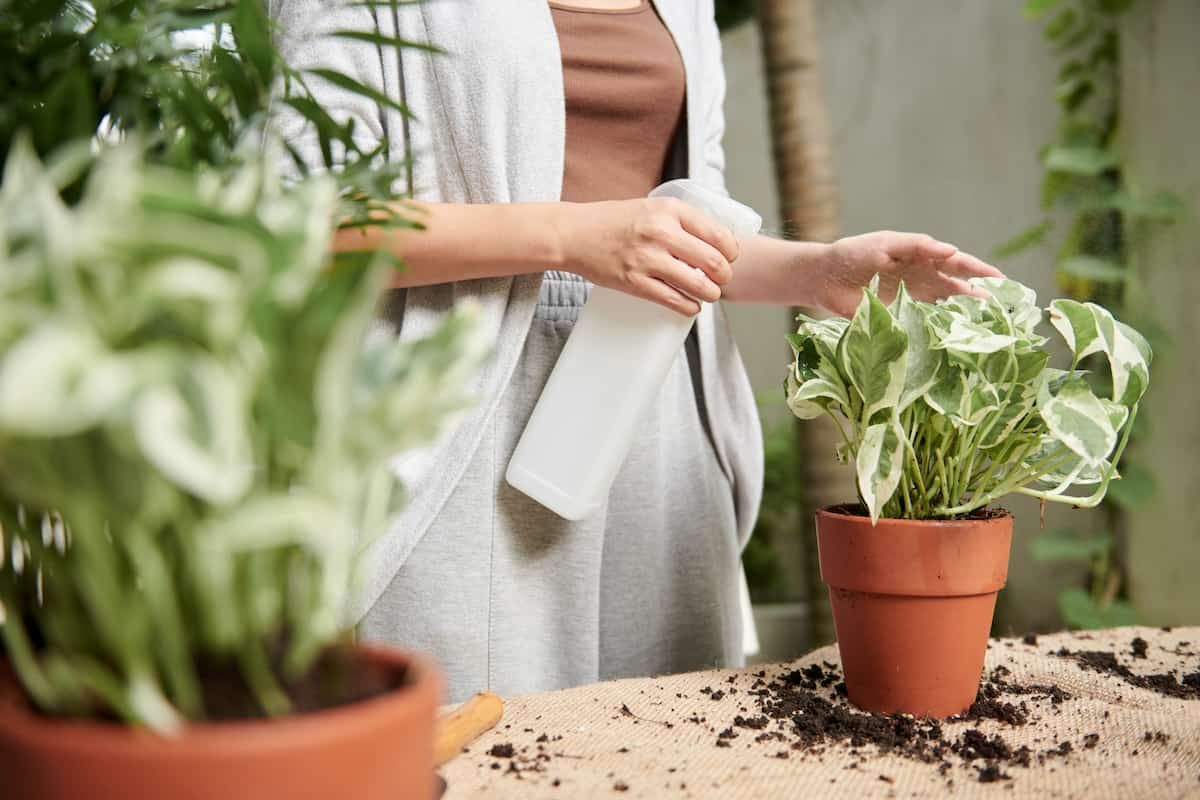Fermented buttermilk is a natural and effective fungicide for garden plants that have been used for centuries. It is a great way to control fungal diseases that affect plants without using harmful chemicals. This article will discuss how to use fermented buttermilk as a natural fungicide for your garden plants.

What is Fermented Buttermilk
Buttermilk is a fermented dairy product that has been used for thousands of years. It is made by adding bacteria to milk, which ferments the lactose in the milk into lactic acid. This process gives buttermilk a sour taste and a thick, creamy texture. Fermented buttermilk is made by leaving buttermilk out at room temperature for several days to allow the lactobacilli bacteria to multiply and ferment further. This process increases the acidity of the buttermilk, making it an excellent natural fungicide for garden plants.
How Does Fermented Buttermilk Work as a Fungicide
Fermented buttermilk works as a fungicide by changing the pH of the plant’s environment. Many fungal diseases thrive in a slightly alkaline environment, and by applying fermented buttermilk to plants, the acidity of the plant’s surface increases, making it less hospitable to fungal spores. Fermented buttermilk also contains beneficial bacteria and enzymes that help to break down fungal spores, making it more difficult for them to take hold and multiply.
How to Make Fermented Buttermilk for Plants
Making fermented buttermilk is a simple process that requires only two ingredients: buttermilk and a glass jar with a tight-fitting lid. Here are the steps to make fermented buttermilk:
- Pour buttermilk into a glass jar until it is about 3/4 full.
- Cover the jar with a tight-fitting lid.
- Leave the jar out at room temperature for 2-3 days. During this time, the lactobacilli bacteria will multiply and ferment the buttermilk.
- After 2-3 days, the buttermilk should have a sour taste and a thicker texture. It is now ready to use as a natural fungicide.
How to Use Fermented Buttermilk as Natural Fungicide
Fermented buttermilk can be used as a natural fungicide for various garden plants, including vegetables, fruits, and ornamental plants. Here’s how to use it:
- Dilute the fermented buttermilk with water in a 1:10 ratio. For example, mix 1 cup of fermented buttermilk with 10 cups of water.
- Pour the diluted fermented buttermilk into a spray bottle.
- Spray the mixture onto the leaves and stems of plants affected by fungal diseases.
- Reapply the mixture every 7-10 days or after heavy rain.
In case you missed it: Seaweed Fertilizers in Agriculture: How to Make, Benefits, NPK Ratio, and Disadvantages

Tips for Using Fermented Buttermilk as a Fungicide
- Use fresh buttermilk: Use fresh, unopened buttermilk to make fermented buttermilk. Do not use buttermilk that has been sitting in the refrigerator for too long.
- Use a glass jar: Use a glass jar with a tight-fitting lid to make fermented buttermilk. Do not use a plastic container, as it may absorb the sour smell.
- Dilute the mixture: Dilute the fermented buttermilk with water in a 1:10 ratio to avoid burning the leaves of the plants.
- Test on a small area: Before applying the mixture to your garden, test it on a small area to ensure it does not harm the plants.
- Apply in the morning or evening: It is best to apply fermented buttermilk in the morning or evening when the sun is not too hot. This will prevent the leaves from burning.
- Store properly: Store fermented buttermilk in the refrigerator when not in use. It will last for up to 2 weeks in the refrigerator.
Benefits of Using Fermented Buttermilk as a Fungicide
- Environmentally friendly: Fermented buttermilk is a natural product that does not contain harmful chemicals, making it an environmentally friendly alternative to chemical fungicides.
- Cost-effective: Fermented buttermilk is an inexpensive alternative to chemical fungicides and can be easily made at home.
- Promoting soil health: Fermented buttermilk contains beneficial microorganisms that can help to improve soil health. These microorganisms break down organic matter in the soil, releasing nutrients essential for plant growth. Additionally, fermented buttermilk can help to balance soil pH, making it more conducive to plant growth.
- Improving plant growth: The beneficial bacteria and enzymes found in fermented buttermilk can help improve plant growth by providing essential nutrients. Additionally, fermented buttermilk can help to strengthen plant cell walls, making plants more resistant to disease and environmental stress.
- Reducing the need for chemical fertilizers: By providing essential nutrients to plants, fermented buttermilk can help to reduce the need for chemical fertilizers. This is beneficial because chemical fertilizers can harm the environment and contribute to soil degradation.
- Supporting beneficial insects: Fermented buttermilk is safe for insects such as bees and butterflies and essential for pollination. By using fermented buttermilk instead of chemical fungicides, gardeners can help to support these important insects.
- Safe for human consumption: Unlike chemical fungicides, fermented buttermilk is safe. It is a traditional ingredient in many recipes and can make delicious baked goods, dressings, and marinades.
- Fermented buttermilk can also be used to prevent powdery mildew: The fungus disease known as powdery mildew is extremely widespread and can be found on a wide variety of plants, including roses, cucumbers, and zucchini. Fermented buttermilk can be used preventatively to reduce the likelihood of powdery mildew taking hold on plants. Simply spray the diluted fermented buttermilk on the plants’ leaves before the disease’s onset.
Overall, fermented buttermilk offers many benefits for gardeners and the environment.
In case you missed it: Benefits of Sheep Manure Fertilizer in Agriculture: Uses, How and When to Apply

Conclusion
Fermented buttermilk is a natural and effective fungicide for garden plants that have been used for centuries. It works by changing the pH of the plant’s environment and by containing beneficial bacteria and enzymes that help to break down fungal spores. Fermented buttermilk is safe for humans and animals, cost-effective, and environmentally friendly. It can be easily made at home and help improve soil and plant health. So, the next time you have a fungal disease affecting your garden plants, use fermented buttermilk as a natural and effective solution.
- Ultimate Guide to Ossabaw Island Hog: Breeding, Raising, Diet, and Care
- Ultimate Guide to Juliana Pig: Raising Facts, Size, Diet, Care, and Lifespan
- Raising Lleyn Sheep: Disadvantages, Price, Uses, Characteristics, and Care
- Ultimate Guide to Meishan Pig: Breed Facts, Breeding, Raising, and Care
- Ultimate Guide to Teacup Pigs: Raising, Diet, Lifespan, Cost, and Care
- Guide to Raising Poll Dorset Sheep: Facts, Profile, Characteristics, Uses, and Care
- Ultimate Guide to Bighorn Sheep: Characteristics, Diet, Lifespan, Breeding, and Lifecycle
- Ultimate Guide to Raising Katahdin Sheep: Farming Facts, Breed Profile, Uses, and Care
- Ultimate Guide to Raising Oreo Cows: Belted Galloways Farming Facts, Profile, Uses, and Care